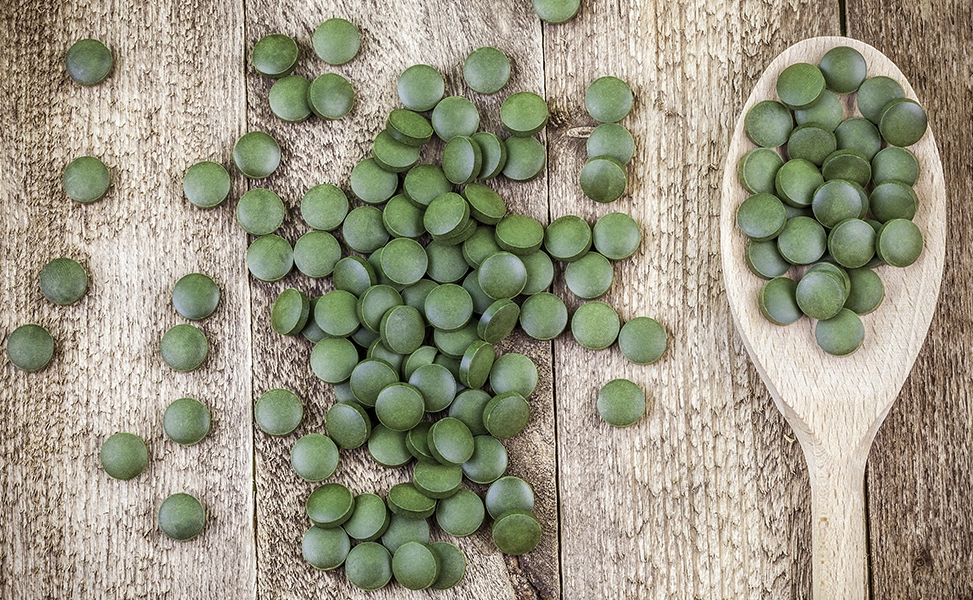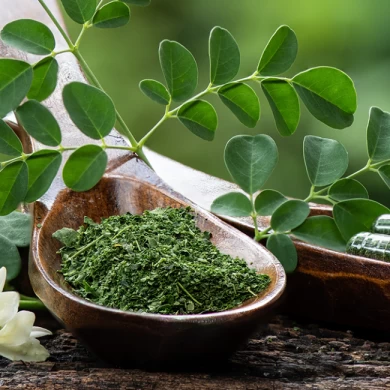All-Natural Supplements
GMP-certified and GMO-Free
Free UK Delivery
Enjoy free shipping on orders above £35
100% Customer Satisfaction
We offer a full 90-day money back guarantee

Supplements
Know Your Algae: Everything You Need to Know about Spirulina and Chlorella
15 Min. Read 26 Mar 2025
- What Are Spirulina and Chlorella?
- Top 14 Benefits of Organic Spirulina and Chlorella
- Is It Safe to Take Spirulina and Chlorella Every Day?
- Potential Side Effects of Spirulina and Chlorella
- When Is the Best Time to Take Spirulina and Chlorella?
- Spirulina vs. Moringa: Which is Better?
- How Much Spirulina Should You Take Per Day?
- How Much Chlorella Should You Take Per Day?
- How to Choose the Best Spirulina and Chlorella Supplement?
- Final Say
- FAQs
- Sources
Algae have taken the world by storm as nutrient-rich superfoods that offer a wealth of health benefits, with Spirulina and Chlorella leading the charge. These two types of algae are packed with essential nutrients, making them popular among those seeking natural wellness boosters. But what sets Spirulina and Chlorella apart? And how can you incorporate them into your daily routine to maximise their benefits?
In this blog, we will understand the nutrient profile of Spirulina and Chlorella, how they are distinct from each other and how they can benefit your well-being. We will also learn about the optimal dosage and potential side effects of these incredible algae superfoods, and explore ways to find the right Spirulina and Chlorella supplement for your everyday needs.
What Are Spirulina and Chlorella?
Spirulina and Chlorella are nutrient-dense algae celebrated for their impressive health benefits and growing popularity as superfoods. Spirulina is a blue-green algae, often recognised by its deep greenish-blue colour, and is incredibly rich in protein, antioxidants, and essential fatty acids. Originating in both fresh and saltwater, Spirulina is packed with vitamins such as B1, B2, and B3, along with iron, calcium, and magnesium, making it a popular supplement for boosting energy, supporting muscle health, and enhancing immunity.
Chlorella, on the other hand, is a green algae that grows in freshwater and is known for its vibrant green colour, thanks to its high chlorophyll content. Renowned for its detoxifying abilities, Chlorella binds to heavy metals in the body, aiding in their removal, and is also a rich source of vitamins C, A, and potassium.
While both Spirulina and Chlorella have powerful antioxidant properties, each of them also offers unique health benefits, thanks to the differences in their nutritional profile: Spirulina shines in its protein and amino acid profile, while Chlorella is celebrated for detoxification and omega-3 fatty acid content. Together, they offer a well-rounded approach to enhancing overall well-being, providing natural ways to improve energy, support cellular health, and promote a balanced diet.
Top 14 Benefits of Organic Spirulina and Chlorella
In this section, we’ll explore ten significant benefits that you can experience by taking organic Spirulina and Chlorella supplements. These pointers will help you understand how these algae can contribute to better health and wellness.
7 Health Benefits of Organic Spirulina
Here are the top health benefits of Spirulina that can help you elevate your physical and mental well-being.
1.Rich Source of Protein and Amino Acids
Spirulina is a powerhouse of protein, boasting around 60–70% protein content. It contains all essential amino acids, making it a fantastic supplement for anyone needing a plant-based protein boost. This protein content helps support muscle repair, growth, and overall vitality.
2.Natural Energy Enhancer
Spirulina is often touted as a natural energy enhancer, thanks to its vitamin B12 and iron content, which help to combat fatigue. Incorporating Spirulina into your diet can provide a sustained energy boost throughout the day, supporting both physical and mental performance.
3. Antioxidant Protection
With high levels of antioxidants, including phycocyanin and chlorophyll, Spirulina protects cells from oxidative damage. These antioxidants help to neutralise harmful free radicals, supporting the immune system and promoting healthier skin.
4. Supports Heart Health
Studies have shown that Spirulina supplementation impacts heart health by helping to maintain healthy cholesterol and blood pressure levels. Its content of gamma-linolenic acid (GLA) supports a balanced lipid profile, making it ideal for heart health.
5. Supports Immune System
Spirulina's rich blend of vitamins and minerals, including vitamins C, E, and zinc, makes it a powerful immune system booster. This helps the body fend off common illnesses, keeping you healthier year-round.
6. Promotes Detoxification
Spirulina assists the body’s natural detoxification processes by binding to heavy metals and toxins, aiding their removal. Its high chlorophyll content supports liver health, helping to cleanse the body and maintain overall wellness.
7. Supports Immune System
Spirulina promotes a balanced gut microbiome, which is crucial for digestive health. It contains prebiotic properties that encourage the growth of beneficial bacteria, supporting digestion, nutrient absorption, and a healthy immune response.
7 Health Benefits of Organic Chlorella
Below are the key benefits that you can cherish with the daily intake of chlorella.
Natural Detoxifier
As per recent studies, Chlorella has detoxifying properties by which it helps eliminate impurities from your body. This makes it an excellent supplement for individuals concerned with reducing toxic loads.
Supports Gut Health
Chlorella contains chlorophyll and fibre, both of which support digestive health. It encourages the growth of beneficial bacteria in the gut, promoting better digestion and regularity.
Improves Skin Quality
Thanks to its antioxidant content, Chlorella can support skin health by helping to fight oxidative stress. This keeps your skin looking fresh and may help reduce the appearance of fine lines and wrinkles.
Enhances Immune Defence
Like Spirulina, Chlorella is rich in immune-supporting vitamins and minerals. Its antioxidants, combined with essential nutrients, can help your immune system function optimally.
May Assist in Weight Management
Chlorella is low in calories and can support weight management when paired with a balanced diet and exercise. Its high nutrient density makes it a satisfying addition to meals, potentially reducing cravings.
Promotes Cardiovascular Health
The nutrients in chlorella help to maintain healthy blood pressure and cholesterol levels, promoting better cardiovascular function. Regular intake of Chlorella can contribute to a balanced lipid profile and reduce inflammation, both key factors in supporting heart health.
Boosts Energy and Vitality
Rich in essential vitamins, iron, and B-complex vitamins, Chlorella can enhance energy levels and reduce feelings of fatigue. Iron supports oxygen transport in the blood, while B vitamins aid in energy production and metabolism. Chlorella’s nutrient profile makes it an excellent supplement for those looking to combat tiredness naturally, providing steady, sustained energy that supports both mental and physical activity throughout the day.
Is It Safe to Take Spirulina and Chlorella Every Day?
Generally, Spirulina and Chlorella are safe for daily use, as they provide essential nutrients and promote overall wellness. Taking these algae daily can ensure you’re consistently benefiting from their high protein content, antioxidants, and detoxifying properties. However, it’s essential to follow dosage recommendations and consult a healthcare provider if you’re new to these supplements or have pre-existing health conditions.
Potential Side Effects of Spirulina and Chlorella
While Spirulina and Chlorella are generally well-tolerated, some people may experience mild side effects, especially when starting. Here are some of the common side effects and what you should know about them.
1. Digestive Discomfort
Some people might experience bloating or digestive discomfort when first taking Spirulina or Chlorella. This is often due to the high nutrient content and fibre, which can be reduced by starting with a smaller dose.
2. Allergic Reactions
Though rare, some people may have allergies to algae, resulting in symptoms such as rash or itching. If you experience any adverse reactions, it’s best to stop taking the supplement.
3. Potential Interaction with Medications
Spirulina and Chlorella may interact with certain medications, especially immunosuppressants. If you’re on medication, consult your doctor before starting these supplements.
4. Detox Symptoms
Chlorella’s detoxifying effects may lead to mild symptoms such as headache or fatigue, particularly in those with high toxic loads. These symptoms often subside as the body adjusts.
5. Iron Sensitivity
As Spirulina and Chlorella are high in iron, those with iron sensitivity or haemochromatosis should be cautious with dosage.
When Is the Best Time to Take Spirulina and Chlorella?
Taking Spirulina and Chlorella at the right time can enhance their benefits. Here’s a guide on the best times for each.
1. Morning for Energy Boost
Taking Spirulina in the morning is an excellent way to start the day with a natural energy boost. It provides a steady source of nutrients that can help keep you alert and energised.
2. Before Meals for Detoxification
Taking Chlorella about 30 minutes before meals can enhance its detoxifying effects, as it can bind to heavy metals and assist in their removal from the digestive tract.
3. Post-Workout for Muscle Recovery
Spirulina’s protein content makes it ideal for post-workout recovery. Its amino acids can aid in muscle repair, supporting faster recovery.
4. Evening for Digestion
Chlorella’s fibre can support digestion when taken in the evening, particularly if you’re looking for added digestive support before bed.
5. Spread Throughout the Day
Some people prefer to split their Spirulina and Chlorella dose throughout the day to enjoy a consistent energy level and nutrient intake.
Spirulina vs. Moringa: Which is Better?
Spirulina and Moringa both have unique benefits, but which one is better depends on your health goals. Spirulina is incredibly protein-dense and rich in essential fatty acids, which are beneficial for muscle and energy. Moringa, on the other hand, is a plant rich in vitamins A, C, and calcium, making it excellent for immune support and bone health. Both have antioxidant properties, so choosing between them often comes down to whether you want the protein boost of Spirulina or the vitamin profile of Moringa.
How Much Spirulina Should You Take Per Day?
Most experts recommend a daily Spirulina dosage of 1 to 3 grams for general wellness, although higher doses may be used for specific health goals. Beginners may want to start with a smaller amount, such as 1 gram, to assess tolerance and gradually increase as desired. It is suggested that you consult with a doctor before starting with a spirulina supplement to know the right dosage as per your health goals and biological conditions.
How Much Chlorella Should You Take Per Day?
While there’s no scientifically proven Recommended Daily Allowance for chlorella, its usual recommended dosage ranges from 2 to 5 grams per day, depending on your health needs and tolerance. Like with Spirulina, starting with a lower dose can help your body adjust, particularly if you’re new to detoxifying supplements. Make sure you consult with a healthcare provider to learn about the optimal dosage for you.
How to Choose the Best Spirulina and Chlorella Supplement?
When selecting a Spirulina and Chlorella supplement, it’s essential to choose a high-quality product to reap the maximum benefits.
1. Organic Certification
Look for organic Spirulina and Chlorella to ensure the algae are free from pesticides and contaminants, which is particularly important given their water-based origin.
2. Trusted Brand with Quality Testing
A reputable brand that conducts quality testing ensures purity, potency, and safety. Avoid products from unregulated sources, as they may contain impurities.
3. Capsules vs. Powder Form
Spirulina and Chlorella come in both capsule and powder forms. Capsules or tablets are convenient for on-the-go use, while powders can be mixed into smoothies for versatile consumption.
4. Look for Non-GMO Products
Non-GMO Spirulina and Chlorella are grown without genetic modification, which is often preferred by those seeking a more natural option.
5. Check for Minimal Additives
Choose products with minimal to no additives, fillers, or artificial ingredients to ensure you’re getting pure Spirulina and Chlorella.
Organic Spirulina and Chlorella Capsules - 180 Capsules 1500 mg
Why Choose Them?
- Market-leading 750 mg Spirulina + 750 mg Chlorella per serving
- 100% organic - Soil Association certified
- Just 2 capsules a day - Enjoy 3 months' supply
- No fillers, binders and GMOs
- 90-day money-back guarantee
Our customers have given an impressive 5/5-star rating. Carl Williams says:
“Pleasantly surprised at how well this product worked. Felt an immediate energy boost."
Final Say
Spirulina and Chlorella are powerful, nutrient-dense algae that can support your health in numerous ways. From providing an energy boost to enhancing detoxification and supporting immune function, these algae are versatile additions to your wellness routine. Whether you’re looking to start your day with a natural energy boost or add nutrient density to your meals, Spirulina and Chlorella offer a range of benefits that make them a valuable part of a balanced lifestyle.
FAQs
Spirulina and Chlorella support energy levels, immune health, and cellular protection. Spirulina’s protein and antioxidants enhance vitality, while Chlorella’s detoxifying properties help eliminate toxins, supporting digestion and overall wellness.
Yes, Spirulina aids the body’s natural cleansing processes with its antioxidants, chlorophyll, and nutrient profile. It supports liver function and helps neutralise toxins, making it a beneficial addition to a balanced diet.
Chlorella is rich in chlorophyll, protein, vitamins A, C, and B12, as well as minerals like iron and potassium. Its nutrient density supports immune health, and detoxification, and provides antioxidants for cellular protection.
Yes, daily intake of Spirulina and Chlorella is generally safe for most people and offers continuous nutrient support. However, it’s wise to follow dosage guidelines and consult a healthcare professional if you have specific health concerns.
Spirulina may aid weight management by supporting metabolism and energy levels, which can help with exercise and fat burning. While it doesn’t directly burn belly fat, it can complement a balanced diet and fitness plan.
Those with autoimmune conditions, allergies to algae, or on specific medications should consult a healthcare professional before taking Spirulina or Chlorella. These supplements may interact with medications or exacerbate certain health conditions.
Yes, Chlorella supports hair health with its rich vitamins, minerals, and antioxidants, which nourish the scalp and may improve hair strength and shine. Its detoxifying effects also contribute to a healthier overall environment for hair growth.
Source
- https://www.medicinenet.com/chlorella_vs_spirulina_whats_the_difference/article.htm
- https://www.webmd.com/diet/spirulina-health-benefits
- https://www.healthline.com/nutrition/10-proven-benefits-of-spirulina#glucose-management
- https://www.healthline.com/nutrition/benefits-of-chlorella
- https://www.webmd.com/vitamins/ai/ingredientmono-907/chlorella
- https://www.health.com/chlorella-vs-spirulina-8635211

Next
On this Page What Is Shilajit? Top 10 Potential Benefits of Shilajit for Men & Women Possible Side Effects of Taking Shilajit How to Consume Shilajit Who Should Avoid Taking Shilajit? Final Say FAQs Sources Shilajit has earned significant recognition...
Most Viewed Articles
7 Proven Health Benefits of Apple Cider Vinegar What Is Apple Cider Vinegar? What Are...
On this page What Are the Top Vitamin B12 Foods? What About Vitamin B12 Supplements?...
On this page What Is Moringa? Moringa Leaves vs Moringa Seeds: Which Is Better? 13...






